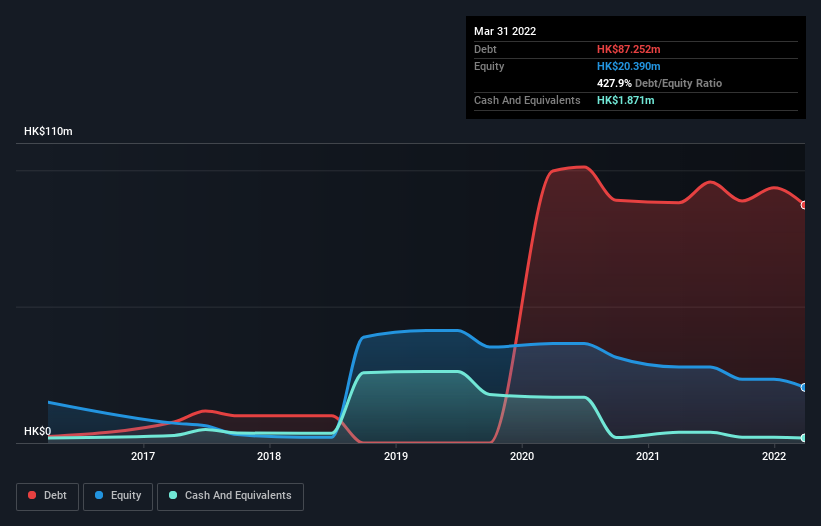- Hong Kong
- /
- Food and Staples Retail
- /
- SEHK:8241
Ying Kee Tea House Group (HKG:8241) Has Debt But No Earnings; Should You Worry?
Howard Marks put it nicely when he said that, rather than worrying about share price volatility, 'The possibility of permanent loss is the risk I worry about... and every practical investor I know worries about.' When we think about how risky a company is, we always like to look at its use of debt, since debt overload can lead to ruin. We can see that Ying Kee Tea House Group Limited (HKG:8241) does use debt in its business. But should shareholders be worried about its use of debt?
When Is Debt A Problem?
Debt assists a business until the business has trouble paying it off, either with new capital or with free cash flow. In the worst case scenario, a company can go bankrupt if it cannot pay its creditors. However, a more usual (but still expensive) situation is where a company must dilute shareholders at a cheap share price simply to get debt under control. Having said that, the most common situation is where a company manages its debt reasonably well - and to its own advantage. When we think about a company's use of debt, we first look at cash and debt together.
View our latest analysis for Ying Kee Tea House Group
What Is Ying Kee Tea House Group's Net Debt?
The chart below, which you can click on for greater detail, shows that Ying Kee Tea House Group had HK$87.3m in debt in March 2022; about the same as the year before. On the flip side, it has HK$1.87m in cash leading to net debt of about HK$85.4m.

How Healthy Is Ying Kee Tea House Group's Balance Sheet?
The latest balance sheet data shows that Ying Kee Tea House Group had liabilities of HK$17.4m due within a year, and liabilities of HK$79.7m falling due after that. Offsetting this, it had HK$1.87m in cash and HK$83.0k in receivables that were due within 12 months. So it has liabilities totalling HK$95.1m more than its cash and near-term receivables, combined.
When you consider that this deficiency exceeds the company's HK$74.5m market capitalization, you might well be inclined to review the balance sheet intently. Hypothetically, extremely heavy dilution would be required if the company were forced to pay down its liabilities by raising capital at the current share price. When analysing debt levels, the balance sheet is the obvious place to start. But it is Ying Kee Tea House Group's earnings that will influence how the balance sheet holds up in the future. So if you're keen to discover more about its earnings, it might be worth checking out this graph of its long term earnings trend.
Over 12 months, Ying Kee Tea House Group saw its revenue hold pretty steady, and it did not report positive earnings before interest and tax. While that's not too bad, we'd prefer see growth.
Caveat Emptor
Over the last twelve months Ying Kee Tea House Group produced an earnings before interest and tax (EBIT) loss. To be specific the EBIT loss came in at HK$4.5m. Considering that alongside the liabilities mentioned above make us nervous about the company. It would need to improve its operations quickly for us to be interested in it. It's fair to say the loss of HK$7.8m didn't encourage us either; we'd like to see a profit. In the meantime, we consider the stock to be risky. When analysing debt levels, the balance sheet is the obvious place to start. However, not all investment risk resides within the balance sheet - far from it. We've identified 3 warning signs with Ying Kee Tea House Group (at least 2 which are a bit unpleasant) , and understanding them should be part of your investment process.
At the end of the day, it's often better to focus on companies that are free from net debt. You can access our special list of such companies (all with a track record of profit growth). It's free.
New: Manage All Your Stock Portfolios in One Place
We've created the ultimate portfolio companion for stock investors, and it's free.
• Connect an unlimited number of Portfolios and see your total in one currency
• Be alerted to new Warning Signs or Risks via email or mobile
• Track the Fair Value of your stocks
Have feedback on this article? Concerned about the content? Get in touch with us directly. Alternatively, email editorial-team (at) simplywallst.com.
This article by Simply Wall St is general in nature. We provide commentary based on historical data and analyst forecasts only using an unbiased methodology and our articles are not intended to be financial advice. It does not constitute a recommendation to buy or sell any stock, and does not take account of your objectives, or your financial situation. We aim to bring you long-term focused analysis driven by fundamental data. Note that our analysis may not factor in the latest price-sensitive company announcements or qualitative material. Simply Wall St has no position in any stocks mentioned.
About SEHK:8241
Ying Kee Tea House Group
An investment holding company, engages in the retail trading of tea products for individual and corporate customers in Hong Kong.
Slight risk with imperfect balance sheet.
Market Insights
Community Narratives


Recently Updated Narratives


The Quiet Giant That Became AI’s Power Grid


Nova Ljubljanska Banka d.d will expect a 11.2% revenue boost driving future growth


The AI Infrastructure Giant Grows Into Its Valuation
Popular Narratives


The company that turned a verb into a global necessity and basically runs the modern internet, digital ads, smartphones, maps, and AI.


MicroVision will explode future revenue by 380.37% with a vision towards success



